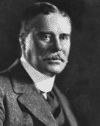 Wister was an American author who is best remembered for his contributions to western fiction. A well-to-do Harvard graduate, he suffered from ill health and summered in the American West, where he gained much inspiration for his writings. His popular 1902 novel The Virginian is regarded as the first western. It tells the tale of a cattle rancher who depends on a harsh code of ethics, and it helped establish the cowboy as an American folk hero. To whom is the book dedicated? Discuss
Wister was an American author who is best remembered for his contributions to western fiction. A well-to-do Harvard graduate, he suffered from ill health and summered in the American West, where he gained much inspiration for his writings. His popular 1902 novel The Virginian is regarded as the first western. It tells the tale of a cattle rancher who depends on a harsh code of ethics, and it helped establish the cowboy as an American folk hero. To whom is the book dedicated? Discuss
Source: The Free Dictionary
 Ford is an American actor who had minor roles on screen and TV before achieving stardom in George Lucas’s 1977 hit movie Star Wars. He then took on the role of Indiana Jones and graduated to dramatic films like Blade Runner, Witness, and The Fugitive. His rugged good looks and wry charm made him one of the most popular actors of his day. A noted conservationist, Ford has had a species of spider and a species of ant named for him. How did he get the scar on his chin?
Ford is an American actor who had minor roles on screen and TV before achieving stardom in George Lucas’s 1977 hit movie Star Wars. He then took on the role of Indiana Jones and graduated to dramatic films like Blade Runner, Witness, and The Fugitive. His rugged good looks and wry charm made him one of the most popular actors of his day. A noted conservationist, Ford has had a species of spider and a species of ant named for him. How did he get the scar on his chin? 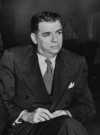 The grandson of an opera impresario of the same name, Hammerstein studied law before beginning the theater career that made him one of the foremost songwriters in the US. In the early 1940s, he began a prolific and successful collaboration with Richard Rodgers that resulted in plays like The King and I, The Sound of Music, and the Pulitzer Prize winners Oklahoma! and South Pacific. How did New York City honor Hammerstein following his death in August 1960?
The grandson of an opera impresario of the same name, Hammerstein studied law before beginning the theater career that made him one of the foremost songwriters in the US. In the early 1940s, he began a prolific and successful collaboration with Richard Rodgers that resulted in plays like The King and I, The Sound of Music, and the Pulitzer Prize winners Oklahoma! and South Pacific. How did New York City honor Hammerstein following his death in August 1960?  Sacks is a British-American neurologist and writer. He immigrated to the US in 1960 to study neurology at the University of California, and in 1965 he joined the faculty at New York’s Albert Einstein College of Medicine. Many of his books relate case histories of neurologically damaged people, particularly those afflicted with unusual conditions. His 1973 book Awakenings, which was made into a film in 1990, chronicles his efforts to treat the survivors of what mysterious sickness?
Sacks is a British-American neurologist and writer. He immigrated to the US in 1960 to study neurology at the University of California, and in 1965 he joined the faculty at New York’s Albert Einstein College of Medicine. Many of his books relate case histories of neurologically damaged people, particularly those afflicted with unusual conditions. His 1973 book Awakenings, which was made into a film in 1990, chronicles his efforts to treat the survivors of what mysterious sickness? 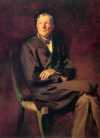 After two years of high school, Rockefeller—the man destined to become, by some estimates, the richest person in history—got a job as a bookkeeper. A few years later, he formed a food handling firm that prospered in the American Civil War. In 1863, he entered the brand new oil business, and within 15 years, his company dominated the American petroleum industry. A noted philanthropist, he donated $550 million during his lifetime. It has been said that Rockefeller had what two ambitions in life?
After two years of high school, Rockefeller—the man destined to become, by some estimates, the richest person in history—got a job as a bookkeeper. A few years later, he formed a food handling firm that prospered in the American Civil War. In 1863, he entered the brand new oil business, and within 15 years, his company dominated the American petroleum industry. A noted philanthropist, he donated $550 million during his lifetime. It has been said that Rockefeller had what two ambitions in life? 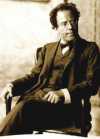 Mahler was an Austrian composer and conductor. After studying in Vienna, he conducted at numerous prominent opera houses where his high standards became legendary, but his refusal to compromise aroused intense personal opposition. He composed in his free time, mostly during the summer, and completed nine symphonies in his lifetime. The biggest success of his career—the 1910 premiere of his eighth symphony—was overshadowed by Mahler’s discovery of his wife’s affair with what famous architect?
Mahler was an Austrian composer and conductor. After studying in Vienna, he conducted at numerous prominent opera houses where his high standards became legendary, but his refusal to compromise aroused intense personal opposition. He composed in his free time, mostly during the summer, and completed nine symphonies in his lifetime. The biggest success of his career—the 1910 premiere of his eighth symphony—was overshadowed by Mahler’s discovery of his wife’s affair with what famous architect? 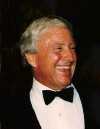 Originally a singer and nightclub performer, Griffin first achieved wider fame in the early 1950s with the hit song I’ve Got a Lovely Bunch of Coconuts. He then shifted his focus to television, hosting The Merv Griffin Show from 1965 to 1986. He created the popular game shows Wheel of Fortune and Jeopardy! and wrote the latter’s famous theme song. Later, he invested in casinos, resorts, and hotels. What humorous epitaph was inscribed on his gravestone?
Originally a singer and nightclub performer, Griffin first achieved wider fame in the early 1950s with the hit song I’ve Got a Lovely Bunch of Coconuts. He then shifted his focus to television, hosting The Merv Griffin Show from 1965 to 1986. He created the popular game shows Wheel of Fortune and Jeopardy! and wrote the latter’s famous theme song. Later, he invested in casinos, resorts, and hotels. What humorous epitaph was inscribed on his gravestone? 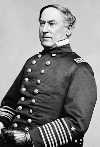 Adopted by a naval officer as a child, Farragut began his naval career as a midshipman at age nine. During the US Civil War, he ran his ships past Confederate forts to capture New Orleans. The victory earned him a prominent place in the Union navy. He was again promoted in 1864, after leading a successful assault on a heavily mined Confederate port. Famously, upon losing a ship during the attack, he allegedly cried out “Damn the torpedoes–full speed ahead!” What naval rank was created for him?
Adopted by a naval officer as a child, Farragut began his naval career as a midshipman at age nine. During the US Civil War, he ran his ships past Confederate forts to capture New Orleans. The victory earned him a prominent place in the Union navy. He was again promoted in 1864, after leading a successful assault on a heavily mined Confederate port. Famously, upon losing a ship during the attack, he allegedly cried out “Damn the torpedoes–full speed ahead!” What naval rank was created for him? 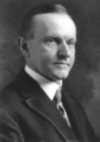 In 1920, Coolidge was elected vice president of the US under Warren G. Harding, who died in 1923—making Coolidge president. Untouched by the scandals of the Harding administration, Coolidge was directly elected president in 1924. He was a popular and deliberately hands-off leader, and though he was an effective public speaker, he was a man of few words when out of the spotlight. Upon hearing that “Silent Cal” had died in 1933, writer Dorothy Parker is said to have delivered what famous remark?
In 1920, Coolidge was elected vice president of the US under Warren G. Harding, who died in 1923—making Coolidge president. Untouched by the scandals of the Harding administration, Coolidge was directly elected president in 1924. He was a popular and deliberately hands-off leader, and though he was an effective public speaker, he was a man of few words when out of the spotlight. Upon hearing that “Silent Cal” had died in 1933, writer Dorothy Parker is said to have delivered what famous remark? 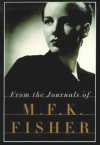 Raised in California, Fisher moved to Dijon, France, after her first marriage. There, she was inspired by the gastronomist Brillat-Savarin, and her 1949 translation of his Physiology of Taste is considered a classic. She created a new literary genre with her culinary writing, producing witty essays evoking the pleasures of life and food in a graceful style. Her books include How to Cook a Wolf and The Gastronomical Me. Where did Fisher spend her last 20 years?
Raised in California, Fisher moved to Dijon, France, after her first marriage. There, she was inspired by the gastronomist Brillat-Savarin, and her 1949 translation of his Physiology of Taste is considered a classic. She created a new literary genre with her culinary writing, producing witty essays evoking the pleasures of life and food in a graceful style. Her books include How to Cook a Wolf and The Gastronomical Me. Where did Fisher spend her last 20 years?